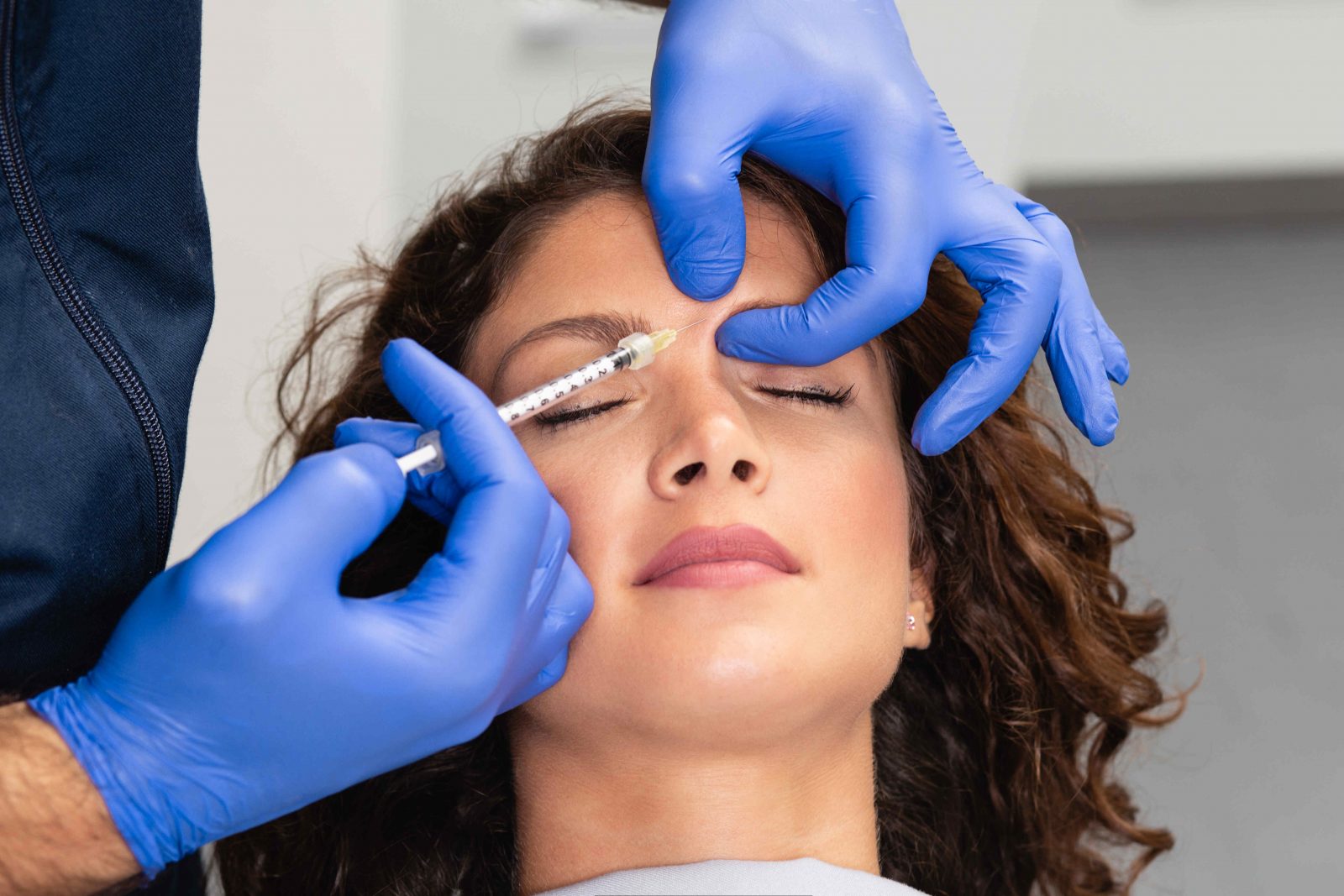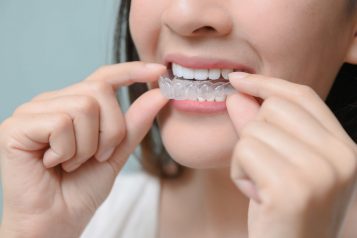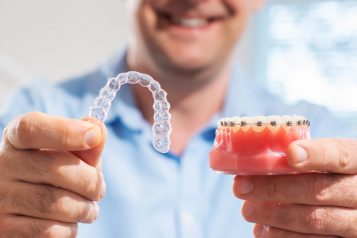 Photo Credit: Shutterstock
Photo Credit: Shutterstock
Cosmetic injectables have been on the rise for quite some time with reasons being valid. Injectables are convenient, have almost instant results, and are considered a low-risk treatment. Haute Beauty sat down with Haute Beauty experts to discuss the things to avoid before getting injectables as well as tips and tricks to prevent bruising and swelling. Here’s what they had to say:
Dr. Jeffrey Lee | Breast Augmentation | Boston
The most common recommendation is to avoid aspirin and ibuprofen. Also, ask about certain supplements and/or vitamins you are taking as some can also increase your chance of bruising. When you show up to your appointment, take off any makeup as you want your injector to see your face as is. Just remember your injector is there to help you feel better about your face so don’t try to hide anything from him/her! When it comes to decreasing your risk of bruising/swelling I tell my patients to ice that day if possible and to avoid strenuous activity or anything that gets their heart rate up for the rest of the day. If you are getting your lips done, I generally recommend sleeping with your head up a little bit on an extra pillow or two.
For more information, visit Dr. Lee’s website, Instagram, or Facebook!
Dr. Jason Bloom | Face | Pennsylvania
To prevent bruising and swelling from injectable treatments, we usually have patients avoid any NSAIDs, aspirin, herbals, or medications that can thin the blood for about a week before treatment. Additionally, avoiding alcohol for about 24 hrs before and after treatment can help to prevent bruising. Alcohol can have a vasodilatory effect and abstaining for a day before injections can help. Also, Arnica Montana pills or sublingual tablets can be taken for about 4-5 days before and after treatment to prevent bruising and swelling from cosmetic injections. I am also working with MEND Nutrition to create a cosmetic supplement that can be taken around injectable treatments to help reduce the risk of swelling and bruising. While I give it to all of my facelift patients, we are investigating the role of a shorter course for injectables.
I think equally as important as some of the above things mentioned beforehand are the things that can be done immediately after and in the days surrounding treatment. The application of ice packs to the injected areas and for a day or so after really reduces swelling and bruising and I recommend it for every patient. The cold helps to vasoconstrict the blood vessels and reduce bruising. I also tell patients to avoid strenuous exercise or workout for about 24 hrs after treatment because of the increased heart rate and increase blood flow and that isn’t great for bruising. Taking an antihistamine the night after injectables can also help to reduce swelling after treatment and I usually recommend that to patients that have injections in the more sensitive areas to swelling like tear troughs and lips.
Finally, if patients do get a bruise or swelling, which is sometimes inevitable, I love the arnica hydrogel pads that can adhere to the skin called OcuMend by Cearna. These cooling gel pads have high levels of arnica & another homeopathic medication in them called Ledum, which helps to decrease inflammation and bruising.
For more information, visit Dr. Bloom’s website, Instagram, or Facebook!
Dr. Kiran Gill | Body | Naples
Swelling, bruising, and redness are all possible side effects of dermal filler and neurotoxin injections, but several simple tips can help to minimize the risk. First, in the weeks before treatment, avoid using medications or supplements with blood-thinning effects, including aspirin or any aspirin-containing product, vitamin E, Ginko Biloba, ginseng, ginger, fish oil, and more. (Your doctor can and should advise you individually.) On the day of treatment, a cold compress can be used before and after injection to constrict blood vessels, which helps to minimize swelling and bruising. A good injector can also prevent bruising by noting bleeds and applying pressure at the time of injection. And because no one can ever guarantee completely avoiding a bruise, it’s always a good idea to schedule injectable treatments at least 2 to 7 days before social or other events. Hands down, the best way to avoid bruising and swelling? —An experienced plastic surgeon! Nothing substitutes for a well-versed hand, an accurate eye, and a gentle touch.
For more information, visit Dr. Gill’s website, Instagram, or Facebook!
Dr. Daisy Ayim | Body | Houston
Injectables are popular non-surgical cosmetic procedures and we have general rules to consider before injection. We recommend to our clients to avoid waxing, tweezing, bleaching or use of hair removal products at least 2 days prior to treatment. Also avoid taking aspirin or other non-steroidal anti-inflammatory drugs such as Motrin, Advil or supplements such as green tea, vitamin E one week in advance of injection. Stay away from alcohol or wine for 24 hours prior to and post-procedure.
Our practice has the following tips to help prevent bruising and swelling. Stay away from any procedure that causes any skin trauma before injections since that easily increases your post injections bruising and swelling risk. While exercising is great for you, we recommend avoid vigorous exercise for 2 days after treatment. Take arnica or bromelain before and after treatment to avoid bruising. Apply an ice pack to the treatment area after the procedure to help with bruising and swelling. Lastly, numbing cream makes you comfortable and helps avoid bruising.
For more information, visit Dr. Ayim’s website, Instagram, or Facebook!
Reana Myers, Careaga Plastic Surgery | Body | Miami/Fort Lauderdale
There are a few things to avoid before getting injectables such as blood-thinning medication like aspirin, Aleve, Advil, Motrin, and ibuprofen. Other supplements to avoid are vitamin E. You should also avoid alcohol at least 24 hours prior to the procedure in order to avoid bruising. After your injectables avoiding alcohol and exercise for the next 24 hours will significantly lower your chances of bruising and swelling. Arnica or Bromelain helps alleviate and decrease the duration of the bruising.
For more information, visit Careaga Plastic Surgery’s website, Instagram, or Facebook!
Dr. P. Daniel Ward | Face | Salt Lake City
One of the most common reasons that people can experience post-treatment bruising is because many medications and herbal supplements can affect platelet function. Perhaps the most common medication that is used that affects the ability of our platelets to seal off any bleeding is ibuprofen. Ibuprofen, the active ingredient in Advil, Motrin, and other anti-inflammatory pain medications is an example of an NSAID or a non-steroid anti-inflammatory drug. Other examples include Naproxen or Naprosyn, Aspirin, and Toradol.
The thing that can be helpful to decrease bruising is to simply hold pressure on the area immediately after the injection. Sometimes, with filler treatments, this may not be possible, because we do not want to displace the location of the filler. However, doing so to the extent can be very beneficial. Similarly, ice can be helpful, because it can help decrease the caliber of the surrounding vessel’s inflammatory response, which will help minimize bleeding and bruising. Other tips and tricks can be found in Dr. Ward’s in-depth reply to all things injectables.
For more information, visit Dr. Ward’s website, Instagram, or Facebook!
Dr. Tatiana Batista, Chicago Breast & Body Aesthetics | Anti-Aging | Chicago
Avoid anti-inflammatory/blood-thinning medications, if possible, for a period of 1-2 weeks before treatment. Medications and supplements such as aspirin, vitamin E, ginkgo biloba, ginseng, St. John’s Wort, Omega 3/Fish Oil supplements, Ibuprofen, Motrin, Advil, Aleve, and other NSAIDS have a blood-thinning effect and can increase the risk of bruising and swelling after injections.
Schedule your facial filler appointment at least 2 weeks prior to a special event that you may be attending, such as a wedding or a vacation. Bruising and swelling may be apparent in that time period. Also, avoid dental procedures (including cleaning) 2 weeks pre-treatments.
Discontinue Retin-A 2 days before and 2 days after treatment. If you have previously suffered from facial cold sores, there is a risk that the needle punctures could contribute to another eruption of cold sores. Please let us know as you may be prescribed antiviral medication prior to treatment. Reschedule your appointment at least 24 hours in advance if you don’t feel good, have a rash, cold sore, or blemish in the area.
For more information, visit Chicago Breast & Body Aesthetic’s website, Instagram, or Facebook!
Dr. Jhonny Salomon | Face & Nose | Miami/Fort Lauderdale
A great way to refresh your face is with cosmetic treatments such as injectables. By taking preventative measures before and after, you can avoid any unnecessary bruising. You should discontinue the use of any over-the-counter pain relievers at least a week before and after you get dermal fillers. Blood-thinning drugs like ibuprofen (Advil & Motrin), aspirin, and Aleve can increase the chances of bleeding and bruising, during and after the injection. You should avoid having any beauty treatments on your face such as facials or massage for a few days after your treatment and stay away from intense heat like sunbathing and saunas until any swelling or redness has resolved.
To prepare for your treatment and minimize any bruising and swelling, you can begin applying arnica creme on the areas that are treated. Arnica is a natural product that helps reduce bruising and swelling. Applying ice for the first 24 hours can help as well.
You need to search for a doctor that is qualified and has the experience to perform the injectables. You want to find someone that has perfected this type of procedure and knows where and how to inject these products in order to provide you with the best possible result.
For more information, visit Dr. Salomon’s website, Instagram, or Facebook!
Dr. Terry E. Restivo | Face | Hawaii
To minimize bruising and swelling I recommend no alcohol, ibuprofen, aspirin, Vitamin E or fish oil 10 days prior to treatment. I also recommend starting oral Arnica Montana at the same time. After the procedure, topical and oral Arnica Montana will really speed up the healing process.
For more information, visit Dr. Restivo’s website, Instagram, or Facebook!
Dr. Viraj J. Mehta, MD. | Eyelid Surgery, Oculoplastic | DMV
The beauty of injectables is that there really are no significant limitations. For the most part, you can continue your typical routine and still get great results in the hands of well-trained physicians and surgeons! But to reduce the risk of bruising or swelling, and to optimize your final outcomes, here are some tips:
Avoid blood thinners for a week before the injections. Blood thinners can include over-the-counter medications, like aspirin, Aleve, Ibuprofen, or supplements, like Vitamin E, ginseng, and ginkgo. If you need blood thinners for medical conditions, don’t worry about it! Speak with your physician injector as it’s usually not an issue.
Avoid topical “anti-aging” products for a couple of days before the injections. This includes products that contain Retinoic Acid, glycolic acid, or salicylic acid, as these products may worsen skin irritation. I usually suggest that patients can resume these products 48 hours after any injectable.
Avoid waxing, bleaching, facials, etc. for a couple of days before the injections, again to help reduce any risk of significant irritation
DO keep yourself well hydrated! This will help improve your skin tone, texture, and quality in general, but also can help with the healing process after injections.
DO consider taking Arnica supplements before and after injections. If you are prone to bruising, this homeopathic supplement may help reduce your risk.
Let your physician or surgeon know if you have any other medical conditions, but injectables are typically safe and effective for most patients!
For more information, visit Dr. Mehta’s website, Instagram, or Facebook!
For more information, visit Dr. Brian A. Levine's social media:

























